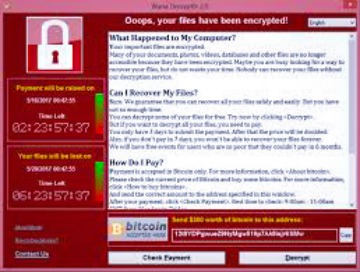The Internet is a delight to many. It can’t be denied with the number of smartphone and smart gadget users these days. We all enjoy 24/7 access to the World Wide Web because there are absolutely endless possibilities when using it. You can finally say goodbye to boredom at the very least or use it for work opportunities, not just simply to connect with family and friends. Unfortunately, dubious people have found another use for the web. No longer do they confine their evil ways to the dark web, cyber criminals also spread havoc to the majority of online users who often only have an anti-virus or firewall to protect them. Some don’t even have some sort of protection at all against these malicious online attacks.
 One of the most popular malware these days is ransomware. What exactly is ransomware? Simply put, it is a type of digital extortion malware. This malware locks your computer or keyboard until you pay a ransom usually in the form of Bitcoins. Until then, you can’t access your PC and all the important files you have saved in it. With the use of a ransom cryptware, cyber criminals use a unique private key to encrypt your computer files aside from locking your device. While it initially targeted PCs and laptops, mobile phones are no longer safe from this new tech headache today.
One of the most popular malware these days is ransomware. What exactly is ransomware? Simply put, it is a type of digital extortion malware. This malware locks your computer or keyboard until you pay a ransom usually in the form of Bitcoins. Until then, you can’t access your PC and all the important files you have saved in it. With the use of a ransom cryptware, cyber criminals use a unique private key to encrypt your computer files aside from locking your device. While it initially targeted PCs and laptops, mobile phones are no longer safe from this new tech headache today.
In the age of cyber threats, companies are stockpiling digital currency in preparation of future "ransomware" attacks — which have grown exponentially over the past few years.
The most recent attack, known as "WannaCry," took hundreds of thousands of computers' data files hostage unless users paid a $300 to $600 ransom via Bitcoin, a popular digital currency. Now many companies are maintaining a stash of the digital cash because of the rise of ransomware, according to cybersecurity experts and firms.
"It's one of the tools in their pockets," said cybersecurity and Bitcoin expert Florin Lazurca, the senior technical marketing manager for security at Citrix Systems. "It's one of the things where you might be trying to cover all your bases, and so it lets you still recover your data and network."
But it's recovery by giving in to the cybercriminals' demands, yet that is the only option for some companies who need immediate access to their data — such as hospitals and financial institutions — and have more money than technological prowess or time. Both were targeted in the recent hack.
Ransomware has been around for quite some time now. It first appeared in Russian and some Eastern European countries in 2005-2009 but the criminals had a hard time collecting the ransom from their victims. But because of Bitcoin’s popularity, cyber criminals found a reliable and anonymous way to extort the money, thus the resurgence of ransomware with a vengeance.
Bitcoin is a kind of digital currency. You can buy it with dollars and euros, just like you can trade any other currency. You store it in an online "wallet." And with that wallet, you can spend bitcoin online and in the physical world for goods and services. Even PayPal supports bitcoin.
And, of course, bitcoin has a valuation, which you may have heard about because bitcoin's price has fluctuated up and down.
You can use bitcoin the same way, but unlike a credit card, the transactions you make using the currency are completely anonymous. They can't be used to identify you personally. Instead, whenever you trade in bitcoin, you use a so-called private key associated with your wallet to generate a bit of code - called an address - that is then publicly associated with your transaction but with no personal identifying information. And in that way, every transaction is recorded and securely signed in an open ledger that anyone can read and double-check.
(Via: http://www.ndtv.com/india-news/why-ransomware-attackers-demanded-payments-in-bitcoins-1693991)
Bitcoin is almost always in the news now because it is the preferred currency of cyber criminals. It is actually a decentralized digital currency, meaning you don’t use it in the physical world nor does it have a central bank repository of its own. Contrary to popular belief about its anonymity in use, bitcoin spending is actually tracked using public records, but because of privacy clauses in the uses of this digital currency, it is the reason why cyber criminals like it best.
The most recent ransomware attack, WannaCry, affected over 200,000 businesses in roughly 150 nations, both the government and private companies through a malicious software sent to potential victims as an email attachment. Since there is no assurance that you’ll get your data again after paying the ransom, victims are strongly discouraged to give the attackers the ransom money. Unfortunately, many are still duped which in turn encourages these attackers to keep spreading this malware over and over again.
The blog post Bitcoin Hoarding: Do You Need It Against Ransomware Attacks? was first published to IPAction.org
source https://ipaction.org/blog/bitcoin-hoarding-do-you-need-it-against-ransomware-attacks/
No comments:
Post a Comment